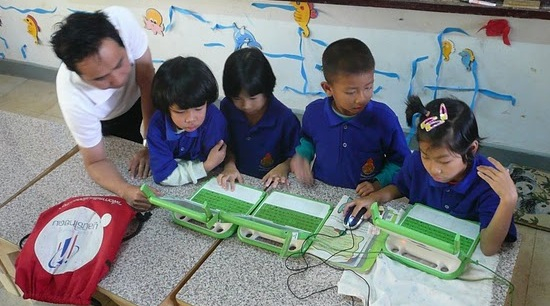
Do you remember back in 2008, when OLPC Thailand was to buy a million XO laptops? After Thai Prime Minister Thaksin Shinawatra was ousted, that plan was abandoned, but not after Thailand received around 500 XO-1 laptops, some even early Beta machines. According to Nsevers, there were at least 5 pilot XO deployment sites:
- Ban Samkha, Lampang Province 40 XOs
Ban Samkha piloted the first XOs in Thailand. They received 20 beta 2 XOs at the end of 2006. This is the earliest deployment that I have heard of, preceding the Beta deployment of 100 machines in Uruguay by about 5 months. There are 40 XOs being used in the school. Each chlid owns their own laptop and brings it home. We have seen the photos of the Ban Samkha children using their XOs for music and for photographing nature. The most successful curriculum project in Ban Samkha is by far the "Household Accounts Project." Many community residents were overextended with credit, and so were unable to pay their bills or even by rice seeds or plants for their small farms. The children have been taught basic household finances, how to make budgets, and to record income and expenses, to help the families plan and budget responsibly. The XO does not have an Activity that will perform the calculations on data entered. Internet and Google Documents spreadsheet is working well to perform this function. The Ban Samkha Community is solidly behind the OLPC Laptop Project. - Tessa Ban 4 Municipal School, Lampang City 40+XOs
- Ban San Kampeng, Chiang Mai, 300 XOs since 2008.
This is a public school of approximately 1000 students. This project has classes of students in grades (forms) 1-5 in which each student owns their laptop, uses it in class and takes it home. These students are being tracked in XO classrooms. With parental permission and enrollment in the XO track, students in each grade will continue in an XO class during the following years. Academic success is being monitored and compared with the students in the non-XO classes. There are learning qualities, unmeasured also; e.g., motivation, learning excitement and creativity. The XO classes are very popular and are over-subscribed and difficult to get into. - Nakhon Nayok (about 1 hour north of Bangkok). 100 Beta 2 XOs.
This is Prateyp's Project in a school that the Princess has specifically chosen for an XO project. This project began following a visit by the Princess to Boston, and to MIT, with a personal meeting with Nicholas Negraponte. For this project, NECTEC, a Suksahpat Pattana Development of Learning Foundation provided software translation services which resulted in software used by OLPC Thailand Projects. - Ban Kayeng Hill Tribe, Chiang Rai, 20 XOs.
The XOs are used in a 6th grade classroom taught in the Thai language. The children bring the computers home. In this pilot, the children were asked to choose a topic that interested them, to research on the Internet and make a related project. This worked very well. One child researched "sushi." He created a "sushi game" using the Scratch Activity, on his XO where the player chooses the ingredients and creates the "sushi" delicacy being ordered in a "restaurant." These children are already learning advanced computer skills with their XOs.
Recently, though, the Bangkok Post published a sad update on OLPC Thailand:
The One Laptop Per Child project begun in 2008 has turned out as badly as most said it would, including the many millions of baht spent on buying the toy-like portable computers involved. A study from Chiang Mai University's engineering faculty confirmed that students issued the cute little machines failed to improve their school performances as OLPC advocates insisted would happen. On the other hand, their marks didn't get worse, either, perhaps because most of the students had access to real computers at home.
Schools in the pilot project for free computers, the OLPC machines are just like real computers only crippled, live in Lampang, Chiang Mai, Chiang Rai, Rayong and Nakhon Si Thammarat. Lecturer Anand Sripitakkiat, who introduced the study, said students needed a new type of classroom atmosphere more than a small, free notebook. He added that students in a regular school with old-fashioned teaching systems would likely not benefit no matter what computer access he had.
While I can't find the actual study, I doubt that "crippled" computers are really to blame. As Anand says, educational change is all about changing the teaching system, not the technology.


What happen with math?
How can we improve the scores?
Why in Spanish classes, students only average answer about 40 percent of test questions corret.